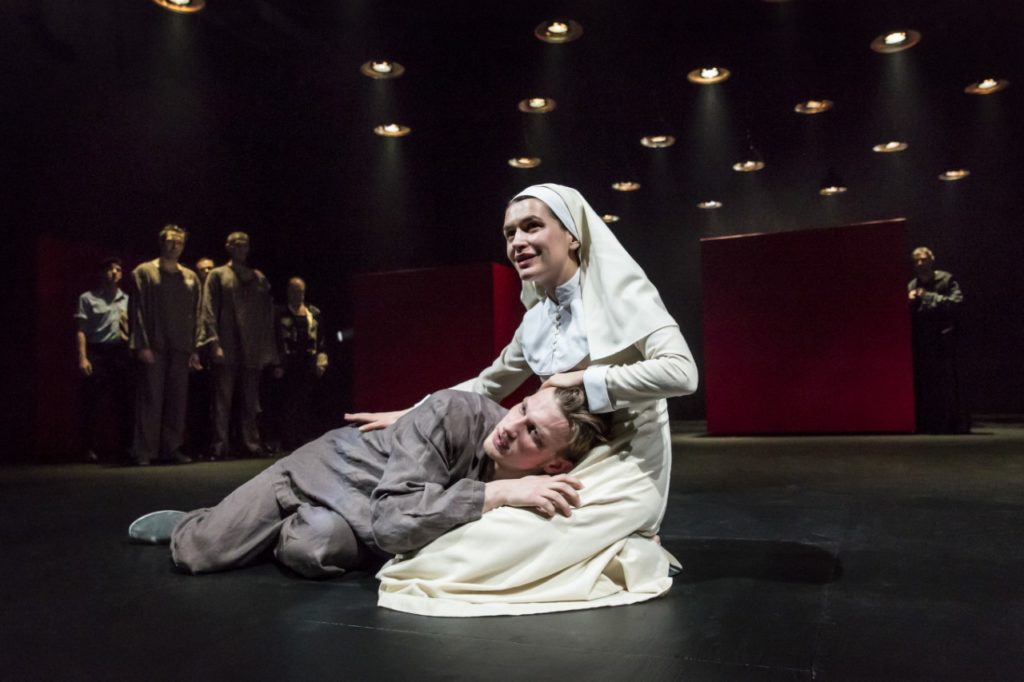Measure for Measure : a stunning production

Boston’s ArtsEmerson is currently showing Measure for Measure, one of Shakespeare’s “problem plays” directed by the widely acclaimed Declan Donnellan of Cheek by Jowl in collaboration with Moscow’s Pushkin Theatre. The production is unusual not only because it is acted in Russian (with English surtitles) but also by virtue of Donnellan’s blocking where most of the cast of thirteen is onstage much of the time often moving in unison. The actors are wonderfully and truthfully emotive.
The play, which has been cut to an hour and fifty minutes, gives the appearance of being set in the present day with the actors dressed in contemporary clothing and the cheap, but modern furniture pieces. Despite the abridgements, the story remains the same. The Duke of Vienna (Alexander Arsentyev) its long time ruler decides to leave and give Lord Angelo (Andrei Kuzichev) the position. But unknown to Angelo, he does not depart. The Duke disguises himself as a friar so that he can keep an eye on the new leader.
Once in power, Angelo denounces unmarried sex which under his rule can be punishable by death. Angelo, who views himself as a righteous figure, has Claudio (Peter Rykov) arrested for having impregnated his fiancée Juliet and sentences him to death the following day. Juliet (Anastasia Lebedeva) is shamed, her hair cut off and forced to wear a gray two piece uniform in this version, but not killed because she is carrying a baby. Desperate for help Claudio sends his friend Lucio (Alexander Feklistov) to inform his sister Isabella of his situation. Isabella (Anna Vardevanian) is living at a convent where she hopes to become a cloistered nun. The stricter the regime, the more appealing the convent is to her. It is a refuge since it is the safest way for her to avoid sex.
Although Catholicism is the religion in Measure for Measure, Puritanism, which existed in Shakespeare’s lifetime, plays a strong role in the work. Angelo’s attitude toward unmarried sex represents his puritanical beliefs though he becomes hypocritical when he meets Isabella. She pleads for her brother’s life, attacks him, kneels to say her rosary beads, and kisses Angelo’s hand before leaving in the hope he will save Claudio. When she leaves, Angelo caresses the chair where she sat. When she returns the next day and discovers the price of Claudio’s life is her virginity, she refuses for the sake of her soul. Angelo starts to undress her, she fights back and departs.
To her dismay Claudio wants her to submit to Angelo. In the guise of the friar the Duke appears with a complicated plan which involves a new character and Isabella’s cooperation to set the situation aright. It succeeds, the Duke reveals himself and the play ends with weddings as Shakespeare’s comedies do. The Duke proposes to Isabella, but she remains silent and looks unhappy. Her desire to remain a virgin is being ignored by someone far more powerful than she. Throughout the play she has worn a white habit and veil. In the last scene as the characters dance, she lets down her hair.
Nick Ormerod’s simple set is set is very effective. It consists of five red tall cubes and many industrial pendants hanging from the ceiling. At times, chairs and/or table are brought in. The space allowed choreographer Irina Kashuba to use sweeping movement. Composer Pavel Akimkin’s varied music supports the production.
Measure for Measure plays at the Emerson Cutler Majestic Theatre from October 24-28.